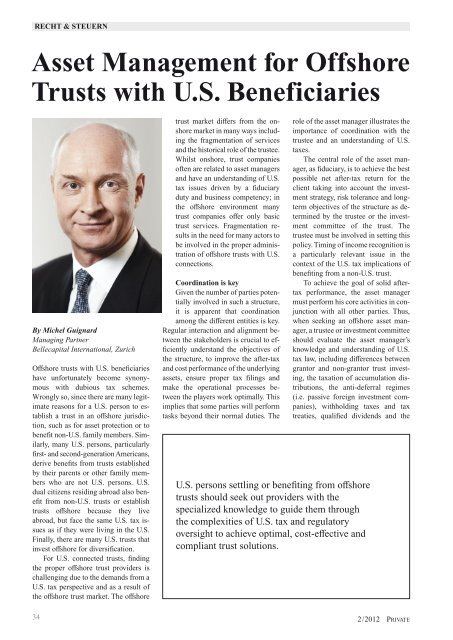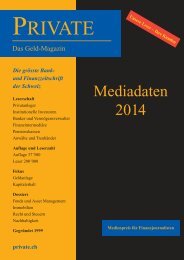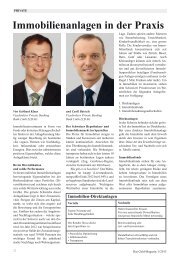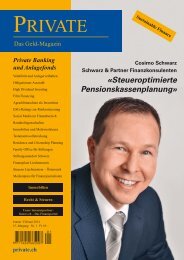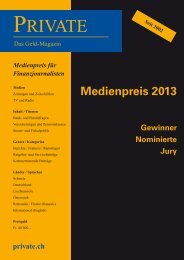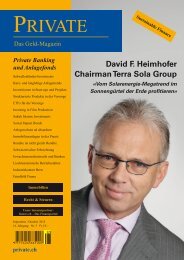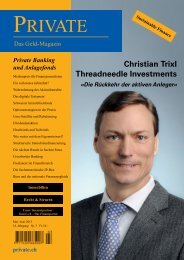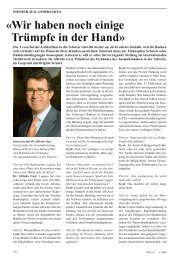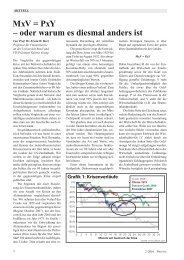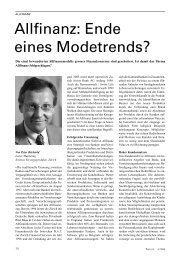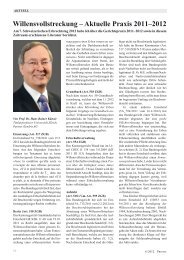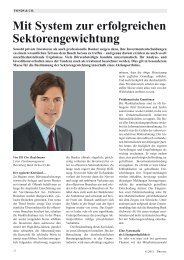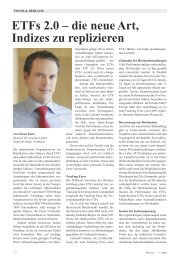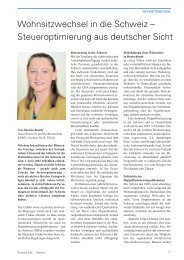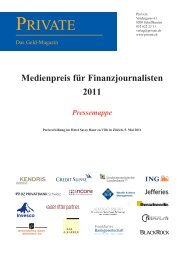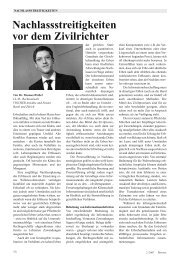1. Preis TV/Radio: Fr. 10'000. - Private Magazin
1. Preis TV/Radio: Fr. 10'000. - Private Magazin
1. Preis TV/Radio: Fr. 10'000. - Private Magazin
Erfolgreiche ePaper selbst erstellen
Machen Sie aus Ihren PDF Publikationen ein blätterbares Flipbook mit unserer einzigartigen Google optimierten e-Paper Software.
RECHT & STEUERN<br />
Asset Management for Offshore<br />
Trusts with U.S. Beneficiaries<br />
By Michel Guignard<br />
Managing Partner<br />
Bellecapital International, Zurich<br />
Offshore trusts with U.S. beneficiaries<br />
have unfortunately become synonymous<br />
with dubious tax schemes.<br />
Wrongly so, since there are many legitimate<br />
reasons for a U.S. person to establish<br />
a trust in an offshore jurisdiction,<br />
such as for asset protection or to<br />
benefit non-U.S. family members. Similarly,<br />
many U.S. persons, particularly<br />
first- and second-generation Americans,<br />
derive benefits from trusts established<br />
by their parents or other family members<br />
who are not U.S. persons. U.S.<br />
dual citizens residing abroad also benefit<br />
from non-U.S. trusts or establish<br />
trusts offshore because they live<br />
abroad, but face the same U.S. tax issues<br />
as if they were living in the U.S.<br />
Finally, there are many U.S. trusts that<br />
invest offshore for diversification.<br />
For U.S. connected trusts, finding<br />
the proper offshore trust providers is<br />
challenging due to the demands from a<br />
U.S. tax perspective and as a result of<br />
the offshore trust market. The offshore<br />
trust market differs from the onshore<br />
market in many ways including<br />
the fragmentation of services<br />
and the historical role of the trustee.<br />
Whilst onshore, trust companies<br />
often are related to asset managers<br />
and have an understanding of U.S.<br />
tax issues driven by a fiduciary<br />
duty and business competency; in<br />
the offshore environment many<br />
trust companies offer only basic<br />
trust services. <strong>Fr</strong>agmentation results<br />
in the need for many actors to<br />
be involved in the proper administration<br />
of offshore trusts with U.S.<br />
connections.<br />
Coordination is key<br />
Given the number of parties potentially<br />
involved in such a structure,<br />
it is ap parent that coordination<br />
among the different entities is key.<br />
Regular inter action and alignment between<br />
the stakeholders is crucial to efficiently<br />
understand the objectives of<br />
the structure, to improve the after-tax<br />
and cost performance of the underlying<br />
assets, ensure proper tax filings and<br />
make the opera tional processes between<br />
the players work optimally. This<br />
implies that some parties will perform<br />
tasks beyond their normal duties. The<br />
role of the asset manager illustrates the<br />
importance of coordination with the<br />
trustee and an understanding of U.S.<br />
taxes.<br />
The central role of the asset man -<br />
ager, as fiduciary, is to achieve the best<br />
possible net after-tax return for the<br />
client taking into account the investment<br />
strategy, risk tolerance and longterm<br />
objectives of the structure as determined<br />
by the trustee or the investment<br />
committee of the trust. The<br />
trustee must be involved in setting this<br />
policy. Timing of income recognition is<br />
a particularly relevant issue in the<br />
context of the U.S. tax implications of<br />
benefiting from a non-U.S. trust.<br />
To achieve the goal of solid aftertax<br />
performance, the asset manager<br />
must perform his core activities in conjunction<br />
with all other parties. Thus,<br />
when seeking an offshore asset man -<br />
ager, a trustee or investment committee<br />
should evaluate the asset manager’s<br />
knowledge and understanding of U.S.<br />
tax law, including differences between<br />
grantor and non-grantor trust investing,<br />
the taxation of accumulation distributions,<br />
the anti-deferral regimes<br />
(i.e. passive foreign investment com -<br />
panies), withholding taxes and tax<br />
treaties, qualified dividends and the<br />
U.S. persons settling or benefiting from offshore<br />
trusts should seek out providers with the<br />
specialized knowledge to guide them through<br />
the complexities of U.S. tax and regulatory<br />
oversight to achieve optimal, cost-effective and<br />
compliant trust solutions.<br />
34 2/2012 PRIVATE


